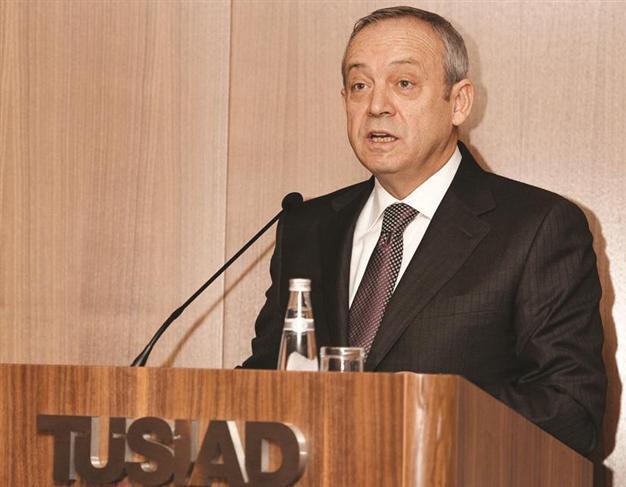Turkish business leaders divided over rate hike
ISTANBUL

Under fire TÜSİAD chair Muharrem Yılmaz speaks at a meeting in Istanbul. AA Photo
Turkey's business world is divided over the impact of the Central Bank’s decision to hike interest rates, with some lauding the move as an act of determination for the Turkish Lira, while others warning of its consequences for investments.The Central Bank raised all of its key interest rates on Jan. 28 to defend the lira, initiating a move that had long been expected by investors concerned over the course of political stability in the country and the U.S. Federal Reserve’s bond tapering plans.
The hike, the impact of which on growth is still being questioned, stirred disparate reactions from representatives of the country’s top business organizations.
Muharrem Yılmaz, chairman of the Turkish Industry and Business Association (TÜSİAD), who recently became the target of harsh criticism from the prime minister for expressing concern over the investment environment in the country, praised the bank’s decision.
“The Central Bank has made an important decision in order to rebalance the market,” Yılmaz said yesterday during a presentation of “Turkey’s Global Competitiveness Level Report,” held in Istanbul.
“With the decision made a few days ago, the Central Bank strongly declared it will intensely focus on the price stability that is at the center of the notion of competition,” he said, expressing hope that the decision would be a turning point for the protection of macroeconomic stability in the country.
The lira has been hitting record lows almost daily this year, under pressure from an escalating political crisis over a corruption scandal roiling the government, as well as liquidity concerns stemming from the Fed's tapering plans.
The Central Bank had previously refrained from raising interest rates to defend the lira, amid government denouncements of an alleged "interest rate lobby," and concerns that any rise in rates could jeopardize its growth targets.
Instead, the Bank has been opting for an unorthodox policy mix, mostly reliant on regular foreign exchange auctions.
A representative of the country’s conservative business leaders, the Independent Industrialists and Businessmen’s Association (MÜSİAD) Chair Nail Opak, thinks the Bank should have continued this unorthodox policy mix.
“We have expressed our opinion that the Central Bank could soothe the devaluation of the lira with different tools,” Opak said Jan. 30.
“Interest rate pressure emerged on the Central Bank in the period beginning with the Gezi incidents to the Dec. 17 [corruption] investigation. Actually, the Central Bank had said it could eliminate pressure on the lira using different tools,” he added.
“As the representatives of the real economy, we don’t find this radical change to be right,” Opak said.
















